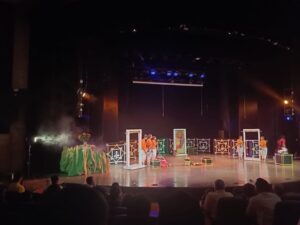The stage at Chandigarh’s Tagore theater came to life after a hiatus of 18 months with Nagamandala, a critically acclaimed play authored by veteran thespian, Girish Karnad.
The play staged on Monday, 27th September, was produced by Satvik Arts society and directed by Amit Sanouria & Sarver Ali.
Nagamandala (1988) hailed as a classic in theatre art derives its inspiration from folk tradition of worshiping cobra, prevalent in coastal districts of the Southern Karnataka. But this conscious return to ancient folklore, as decoded by Aparna Dharwadker, is Karnad’s attempt to employ “traditional Indian narrative material and modes of performance to create a radically modern urban theatre” with imprints of modern-day social crisis.
The story trail
The play runs around a trio of Appanna, a metaphor of male pride, his wife from countryside, Rani and a Naga (King Cobra). Being married to Appanna, is a tryst with solitude for Rani as her husband remains occupied with concubines for most of the day. Kurudamma, a blind woman and a relative of Appanna moved by the tragedy of the newly married girl, suggests Rani a trick to win over her husband attention. A paste which was supposed to be mixed with the food, triggers an explosion in the curry and frightened by the same, Rani throws it into an ant hill which excites the Cobra residing therein. “Thereafter Cobra keeps on visiting Rani every night camouflaged as Appanna. For Rani the two editions of Appanna (Day and night) are conflicting extremes in terms of compassion and no wonder she is taken over by a sense of surprise and disbelief as Appanna hates to even see her in daytime.”, tells Jayantika Jain, a member of Satvik Art Society to The Voices.
 Eventually, Rani gets pregnant one day, and Appanna accuses her of disloyalty. The accusations trigger village panchayat to make Rani prove her innocence by either holding a hot iron rod or by placing her hand in the burrow of the Cobra. Rani opts for the later and emerges safe which not only earns her a title of mother goddess, but also the reverence from Appanna. The Cobra still takes shelter in her tresses, and one day, on being discovered by Appanna, who attempts to kill it, is offered a permanent abode in Rani’s hairlocks…“Live in here, happily, forever”, says Rani.
Eventually, Rani gets pregnant one day, and Appanna accuses her of disloyalty. The accusations trigger village panchayat to make Rani prove her innocence by either holding a hot iron rod or by placing her hand in the burrow of the Cobra. Rani opts for the later and emerges safe which not only earns her a title of mother goddess, but also the reverence from Appanna. The Cobra still takes shelter in her tresses, and one day, on being discovered by Appanna, who attempts to kill it, is offered a permanent abode in Rani’s hairlocks…“Live in here, happily, forever”, says Rani.
As per critique Dolors Collellmir, “her satisfactory emotional relationship with the Cobra culminates in the awakening of consciousness” and it is the same sense of consciousness which has been offered the permanent shelter in her hairlocks.
As it unfolded
The play which exploits the mystical charm of a folklore to question the gender  genesis of society was well lived on-stage, with it’s mystical appeal intact, by the performers at Tagore theater. It was a version which was nearer to the popular adaption rather than the classical one. A low-profile yet intense lighting arrangement by director Sarver Ali himself augmented the appeal. Durgesh Atwal’s Music, and a dark lit stage designed by Maneesh Pachiaru, transfused the sense of rustic mysticism while the show unfolded.
genesis of society was well lived on-stage, with it’s mystical appeal intact, by the performers at Tagore theater. It was a version which was nearer to the popular adaption rather than the classical one. A low-profile yet intense lighting arrangement by director Sarver Ali himself augmented the appeal. Durgesh Atwal’s Music, and a dark lit stage designed by Maneesh Pachiaru, transfused the sense of rustic mysticism while the show unfolded.
Coming out of the long halt to artistic adventures, Sarver Ali, the director of the play felt liberated. He told The Voices “It was a bitter long gap; That pain is inexplicable; it’s a restart, we are feeling happy and wish about not being hit by the hard time again. Hopefully, administration will soon consider further relaxations to seating constraints.” 
Show was very well received by audience too. Mrs. Vandana who visited Chandigarh from Ambala, to watch the Nagamandala, told The Voices “The performance was simply amazing and I am speechless. The intensity of the subject was really moving.”
Visitors were also excited about being back in abodes of cultural indulgences. A visitor shared her experience with The Voices. “At the very outset, being here at Tagore Theatre after rounds of lockdown is a good feeling. The play was extremely well written, and amazingly complimented by subject oriented music, lighting.”
The event was organised in strict adherence to COVID-19 protocols. Despite various restrictions 80% occupancy of theater was cherished by artist community and organisers who were hopeful about the surge of opportunities in times to come.
‘Nagamandala’, mythical storytelling loaded with contemporary gender discourse featured Divjot Gulati as Rani, Durgesh Atwal as Appanna, Shivam Dhall as Naag.
Image courtesy: Jayantika Jain
Edited by: NK Jha


1 Comment
Curtains finally rise in the #postCOVID19world for theater lovers at Tagore theatre Chandigarh with ‘Nagamandala’ ; a Girish Karnad masterpiece.
Sunil Kumar Gund of @TheVoices_IGNOU reports.
http://medialit.in/thevoices/postcovid-tagoretheatre-chandigarh/
https://www.instagram.com/p/CVHuPnULAaM/?utm_medium=copy_link
https://www.facebook.com/542131923370620/posts/730582011192276/
https://twitter.com/TheVoices_IGNOU/status/1449627076634427392?t=UZ_n6bmrKpt6xu7OVmp5aw&s=09